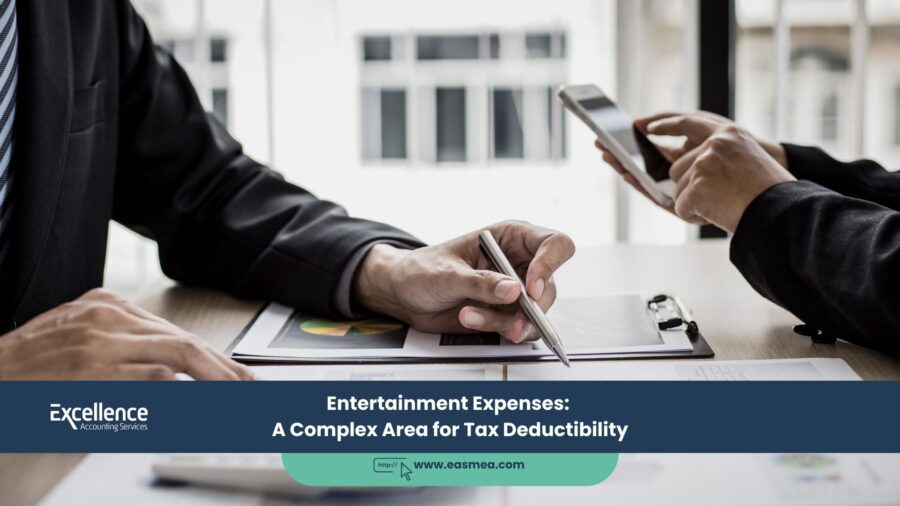Entertainment Expenses: A Complex Area for Tax Deductibility in the UAE
Entertaining clients, rewarding staff, and building business relationships are integral parts of doing business in the UAE. From a business perspective, these expenses are often a necessary cost of generating goodwill and revenue. From a tax perspective, however, they are one of the most complex and scrutinized areas of deductibility. With the introduction of Corporate Tax, businesses now have to navigate two separate and very different sets of rules for entertainment expenses: one for Corporate Tax and another for VAT.
- Entertainment Expenses: A Complex Area for Tax Deductibility in the UAE
- Corporate Tax: The 50% Deductibility Rule
- VAT: The General Rule of Non-Recoverability
- Putting It All Together: A Clear Comparison
- Navigating Tax Complexity with Excellence Accounting Services (EAS)
- Frequently Asked Questions (FAQs)
- Confused by the Rules for Entertainment Expenses?
A common and costly mistake is to assume that the rules are the same for both taxes. They are not. The treatment for deducting the expense from your profit for Corporate Tax is completely different from the rules for reclaiming the VAT paid on that same expense. Understanding this distinction is crucial for accurate tax filing, correct financial reporting, and avoiding penalties from the Federal Tax Authority (FTA).
This guide will provide a clear breakdown of the rules for entertainment expenses under both the UAE Corporate Tax and VAT laws. We will explain the 50% deductibility cap for Corporate Tax, the general non-recoverability for VAT, and provide practical examples to clarify this complex but critical area of compliance.
Key Takeaways
- Two Taxes, Two Different Rules: The rules for deducting entertainment expenses for Corporate Tax are completely separate from the rules for reclaiming input VAT on them.
- Corporate Tax Rule: 50% Deductible. For Corporate Tax purposes, you can generally deduct **50%** of legitimate entertainment, amusement, or recreation expenses incurred for business purposes.
- VAT Rule: Generally Not Recoverable. For VAT purposes, input tax on entertainment expenses is generally **blocked** and cannot be recovered. There are very limited exceptions for employees and simple hospitality.
- Clear Policy is Essential: You must have a clear and consistently applied internal expense policy that defines what constitutes a legitimate business entertainment expense.
- Meticulous Records are a Must: To claim any deduction, you must maintain detailed records, including invoices and the business purpose of the expense. This is a key focus of professional accounting and bookkeeping.
Corporate Tax: The 50% Deductibility Rule
The UAE Corporate Tax Law allows businesses to deduct expenses that are incurred “wholly and exclusively” for the purpose of the business. However, it places a specific restriction on entertainment expenses.
Under Article 28 of the Corporate Tax Law, only **50% of any entertainment, amusement, or recreation expenditure** is deductible.
This includes costs for:
- Meals with clients, suppliers, or other business partners.
- Tickets to sporting or cultural events.
- Corporate hospitality events like golf days or gala dinners.
Example: You take a potential client to a business lunch that costs AED 1,000. When calculating your taxable income for Corporate Tax, you can only deduct AED 500 (50% of the cost) as a business expense. The other AED 500 is a non-deductible expense.
For Corporate Tax, the question is not *if* the expense is for business, but recognizing that the law only allows half of that legitimate expense to be deducted from your profit.
VAT: The General Rule of Non-Recoverability
The rules for VAT are much stricter. The general principle is that input tax on any costs that are used for entertainment purposes is **blocked** and cannot be recovered. This applies even if the expense is 100% for a legitimate business purpose.
As we’ve detailed in our guide on VAT on Business Entertainment Expenses, the key distinction is who is being entertained.
- For Non-Employees (Clients, etc.): You **cannot** recover the VAT on meals, events, or other hospitality. The only exception is for “simple hospitality” like tea and coffee served during a meeting at your office.
- For Employees: You **can** recover the VAT on staff entertainment (like a year-end party) if you have a legal or contractual obligation to provide it, which can be established through a documented company policy.
Example (continued): On the same AED 1,000 business lunch with a client, you paid AED 50 in VAT (1000 * 5%). Because this was entertainment for a non-employee, you **cannot** recover this AED 50 as input tax on your VAT return. It becomes a sunk cost for the business.
Putting It All Together: A Clear Comparison
| Scenario | Corporate Tax Treatment | VAT Treatment |
|---|---|---|
| Business lunch with a client (Cost: AED 1,000 + 50 VAT) | AED 500 is deductible. (50% of the net cost) | The AED 50 input VAT is **not** recoverable. |
| Annual staff party (Cost: AED 20,000 + 1,000 VAT) | AED 10,000 is deductible. (50% of the net cost) | The AED 1,000 input VAT **is** recoverable (assuming a clear policy). |
| Coffee and dates for a client meeting in your office (Cost: AED 100 + 5 VAT) | AED 50 is deductible. (50% of the net cost) | The AED 5 input VAT **is** recoverable (as simple hospitality). |
Navigating Tax Complexity with Excellence Accounting Services (EAS)
The divergent treatment of entertainment expenses under two different tax laws creates a significant compliance challenge. EAS provides the expert guidance needed to navigate this complexity.
- Expert Tax Advisory: Our tax experts provide clear, practical advice on the deductibility and recoverability of all your business expenses under both Corporate Tax and VAT laws.
- Expense Policy Development: We help you draft a clear and robust internal expense policy that defines what constitutes legitimate entertainment and provides the necessary documentation for your tax filings.
- Outsourced Accounting and Tax Filing: We manage your bookkeeping and tax filing processes, ensuring that entertainment expenses are correctly categorized and treated in both your VAT and Corporate Tax returns.
- Strategic CFO Services: We provide high-level strategic advice on budgeting and cost control, helping you to manage your entertainment spend effectively.
Frequently Asked Questions (FAQs)
It is broadly defined as any expenditure on hospitality, amusement, or recreation. This includes food, drink, accommodation, access to events, or pleasure trips provided to clients, staff, or other business partners.
This is a common practice in many tax systems around the world. It recognizes that entertainment expenses often have a dual nature—they serve a business purpose but also contain an element of personal enjoyment or consumption. The 50% rule is a standardized way to account for this dual character.
You must keep meticulous records. For a business meal, this would include the tax invoice from the restaurant, and a note of who attended the meal and the specific business purpose that was discussed. Without this documentation, the FTA could disallow the deduction entirely.
No. The direct costs of business travel, such as flights and hotel stays for an employee, are generally 100% deductible for Corporate Tax. The 50% limit only applies to the entertainment element, such as taking a client out to dinner during that trip.
This is a grey area. Costs directly related to marketing and promotion (e.g., venue hire, product displays) may be 100% deductible. However, any costs related to providing hospitality (e.g., food, drinks, or entertainment) at that event would be subject to the 50% limit.
This does not need to be in an individual’s employment contract. A documented company policy that creates a reasonable expectation for staff (e.g., a policy stating the company will host an annual year-end party) is generally sufficient to establish a contractual obligation.
No. The 50% deduction is calculated on the net expense. If the input VAT on the expense is non-recoverable (as is often the case), that non-recoverable VAT amount becomes part of the total expense, and you can then deduct 50% of that total. For the AED 1,000 lunch + 50 VAT, the total cost to the business is AED 1,050. The deductible amount for CT would be 50% of 1,050 = AED 525.
Gifts are generally considered entertainment. For Corporate Tax, 50% of the cost would be deductible. For VAT, the input tax is not recoverable if the gift exceeds AED 500 in value per recipient over a 12-month period.
No, the rules apply based on the nature of the expense, not the seniority of the employee. The key tests are whether it’s a legitimate business expense and who is being entertained (employee vs. non-employee).
A clear, simple, and well-communicated employee expense policy is the only way. The policy should explicitly state what is and is not a permissible expense and outline the documentation required for every claim. This should be supported by training for all staff who incur expenses.
Conclusion: A Tale of Two Taxes
The treatment of entertainment expenses is a perfect illustration of the need for careful, integrated tax planning in the UAE. Businesses must wear two different hats, analyzing each expense through the lens of both Corporate Tax and VAT. By understanding the distinct rules, maintaining meticulous records, and establishing clear internal policies, you can navigate this complex area with confidence, ensuring you remain compliant while claiming every deduction and credit to which you are entitled.
Confused by the Rules for Entertainment Expenses?
Contact Excellence Accounting Services for a comprehensive review of your expense policies and tax treatment.




